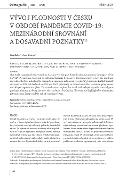Vývoj plodnosti v Česku v období pandemie covid-19: Mezinárodní srovnání a dosavadní poznatky
( Fertility development in Czechia during the covid-19 pandemic: international comparision and current knowledge )

Publication date
2025Published in
DemografieVolume / Issue
67 (1)ISBN / ISSN
ISSN: 0011-8265ISBN / ISSN
eISSN: 1805-2991Metadata
Show full item recordCollections
This publication has a published version with DOI 10.54694/dem.0357
Abstract
Tato studie zkoumá vývoj plodnosti v Česku v posledních třech desetiletích se zaměřením na dopad pandemie COVID-19. Na základě publikovaných zjištění z celé Evropy zkoumá, jak pandemie a související faktory, včetně očkovací kampaně, ovlivnily reprodukční chování. Plodnost se zpočátku zvýšila v roce 2021, ale v letech 2022 a 2023 poklesla, potenciálně v souvislosti s očkovacími programy a odloženými reprodukčními plány. Tento trend vysvětlují tři mechanismy, přičemž pro Česko jsou nejvýznamnějšími faktory opožděná reprodukce a postpandemické úpravy. Studie rovněž poukazuje na širší vzorce plodnosti v Evropě a na roli ekonomických faktorů.
This study examines fertility trends in Czechia over the past three decades, focusing on the impact of the COVID-19 pandemic. Drawing on published findings from across Europe, it explores how the pandemic and related factors, including the vaccination campaign, influenced reproductive behaviour. Fertility initially increased in 2021 but declined in 2022 and 2023, potentially in connection with vaccination programmes and delayed reproductive plans. Three mechanisms explain this trend, with delayed reproduction and post-pandemic adjustments being the most relevant factors for Czechia. The study also highlights broader fertility patterns across Europe and the role of economic factors.
Keywords
plodnost, Česko, pandemie COVID-19, evropský kontext
fertility, Czechia, COVID-19 pandemic, European context
Permanent link
https://hdl.handle.net/20.500.14178/3124License
Full text of this result is licensed under: Creative Commons Uveďte původ-Neužívejte dílo komerčně-Zachovejte licenci 4.0 International






